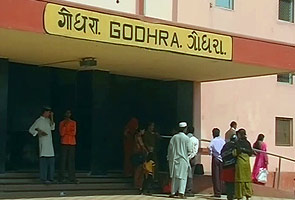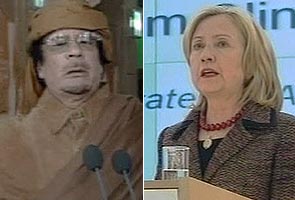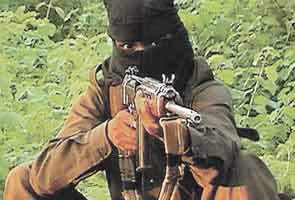Tripoli: International pressure on Moammar Gaddafi to end a crackdown on opponents escalated Monday as his loyalists fought rebels holding the two cities closest to the capital and his warplanes bombed an ammunition depot in the east. The U.S. moved naval and air forces closer to Libya and said all options were open, including patrols of the North African nation's skies to protect its citizens from their ruler.
France said it would fly aid to the opposition-controlled eastern half of the country. The European Union (EU) imposed an arms embargo and other sanctions, following the lead of the U.S. and the U.N. The EU was also considering the creation of a no-fly zone over Libya. And the U.S. and Europe were freezing billions in Libya's foreign assets.
"Gaddafi has lost the legitimacy to govern, and it is time for him to go without further violence or delay," U.S. Secretary of State Hillary Rodham Clinton said. "No option is off the table. That of course includes a no-fly zone," she added. British Prime Minister David Cameron told lawmakers: "We do not in any way rule out the use of military assets" to deal with Gadhafi's regime.
Gaddafi, who in the past two weeks has launched the most brutal crackdown of any Arab regime facing a wave of popular uprisings, laughed off a question from ABC News about whether he would step down as the Obama administration demands.
"My people love me. They would die for me," he said. ABC reported that Gaddafi invited the United Nations or any other organization to Libya on a fact-finding mission.
Gaddafi's remarks were met with derision in Washington. "It sounds, just frankly, delusional," said U.S. Ambassador to the U.N. Susan Rice. She added that Gaddafi's behaviour, including laughing on camera in TV interviews amid the chaos, "underscores how unfit he is to lead and how disconnected he is from reality."
The turmoil in the oil-rich nation roiled markets for another day. Libya's oil chief said production had been cut by around 50 per cent, denting supplies that go primarily to Europe. The country provides 2 per cent of the world's oil, but concerns the unrest will spread to other oil-rich nations has sent oil prices rising worldwide.
The uprising that began February 15 has posed the most serious challenge to Gaddafi in his more than four decades in power. His bloody crackdown has left hundreds, and perhaps thousands, dead. But clashes appear to have eased considerably in the past few days after planeloads of foreign journalists arrived in the capital at the government's invitation.
The two sides are entrenched, and the direction the uprising takes next could depend on which can hold out longest. Gaddafi is dug in in Tripoli and nearby cities, backed by his elite security forces and militiamen who are generally better armed than the military. His opponents, holding the east and much of the country's oil infrastructure, also control pockets in western Libya near Tripoli. They are backed by mutinous army units, but those forces appear to have limited supplies of ammunition and weapons.
Gaddafi opponents have moved to consolidate their hold in the east, centred on Benghazi -- Libya's second- largest city, where the uprising began. Politicians there on Sunday set up their first leadership council to manage day-to-day affairs, taking a step toward forming what could be an alternative to Gaddafi's regime.
The opposition is backed by numerous units of the military in the east that joined the uprising, and they hold several bases and Benghazi's airport. But so far, the units do not appear to have melded into a unified fighting force. Gaddafi long kept the military weak, fearing a challenge to his rule; so many units are plagued by shortages of supplies and ammunition.
On Monday, pro-Gaddafi forces retook control of the western border crossings with Tunisia that had fallen under opposition control and they bombed an ammunition depot in the rebel-held east, residents in the area said. The Libyan Defence Ministry denied the bombing.
Regime forces also moved to tighten their ring around two opposition-controlled cities closest to the capital Tripoli -- Zawiya and Misrata -- where the two sides are locked in standoffs.
An Associated Press reporter saw a large, pro-Gadhafi force massed on the western edge of Zawiya, some 30 miles (50 kilometres) west of Tripoli, with about a dozen armoured vehicles along with tanks and jeeps mounted with anti-aircraft guns. An officer said they were from the elite Khamis Brigade, named after one of Gaddafi's sons who commands it. U.S. diplomats have said the brigade is the best-equipped force in Libya.
A resident of Zawiya said by telephone that fighting started in the evening and intensified after sundown when troops loyal to Gaddafi attacked the city from the west and east.
"We were able to repulse the attack. We damaged a tank with an RPG. The mercenaries fled after that," said the resident, who spoke on condition of anonymity for fear of government reprisals.
He said Gaddafi called Zawiya's influential tribal leader Mohammed al-Maktouf and warned him that if the rebels don't leave the city's main square by early Tuesday, they will be hit by warplanes. "We are expecting a major battle," the resident said, added that the rebels killed eight soldiers and mercenaries Monday.
Another resident of Zawiya said he heard gunfire well into the night on the outskirts of town.
In Misrata, Libya's third-largest city 125 miles (200 kilometres) east of Tripoli, pro-Gaddafi troops who control part of an air base on the outskirts tried to advance Monday. But they were repulsed by opposition forces, which included residents with automatic weapons and defected army units allied with them, one of the opposition fighters said.
No casualties were reported and the fighter claimed that his side had captured eight soldiers, including a senior officer.
The opposition controls most of the air base, and the fighter said dozens of anti-Gaddafi gunmen have arrived from farther east in recent days as reinforcements.
Several residents of the eastern city of Ajdabiya said Gaddafi's air force also bombed an ammunition depot nearby held by rebels. One resident, 17-year-old Abdel-Bari Zwei, reported intermittent explosions and a fire, and another, Faraj al-Maghrabi, said the facility was partially damaged. The site contains bombs, missiles and ammunition -- key for the undersupplied opposition military forces.
State TV carried a statement by Libya's Defence Ministry denying any attempt to bomb the depot. Ajdabiya is about 450 miles (750 kilometres) east of Tripoli along the Mediterranean coast.
Gaddafi supporters said they were in control of the city of Sabratha, west of Tripoli, which has seemed to go back and forth between the two camps in the past week. Several residents told the AP that protesters set fire to a police station, but then were dispersed. Anti-Gaddafi graffiti -- "Down with the enemy of freedom" and "Libya is free, Gaddafi must leave" -- were scrawled on some walls, but residents were painting them over.
There were signs of economic distress in the country, with prices skyrocketing and long lines forming for bread and gasoline.
Global efforts to halt Gaddafi's crackdown escalated Monday.
In Washington, the Pentagon said it was moving some naval and air forces closer to Libya in case they are needed. The U.S. has a regular military presence in the Mediterranean and farther to the south has two aircraft carriers in the Persian Gulf area.
The U.S. Treasury Department said that at least $30 billion in Libyan assets have been frozen since President Barack Obama imposed sanctions on Libya last week.
France promised to send two planes with humanitarian aid to the eastern opposition stronghold city of Benghazi, hoping to give it the momentum to oust Gaddafi. The aid including medicine and doctors would be the first direct Western help for the uprising that has taken control of the entire eastern half of Libya. French Prime Minister Francois Fillon said it was the start of a "massive operation of humanitarian support" for the east and that Paris was studying "all solutions" -- including military options.
The EU slapped its own arms embargo, visa ban and other sanctions on Gaddafi's regime, following sanctions imposed by the U.S. and the U.N. in the past week. And Europe was also considering the imposition of a no-fly zone over Libya to prevent any air attacks by the regime on rebellious citizens.
Clinton met in Geneva with foreign ministers from Britain, France, Germany and Italy to press for tough sanctions on the Libyan government.


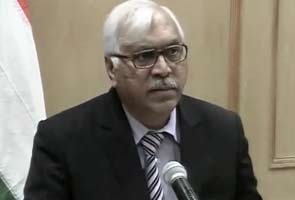
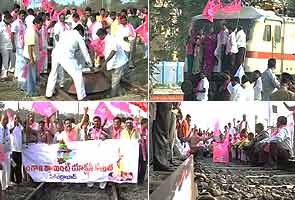
 Click to Expand & Play
Click to Expand & Play